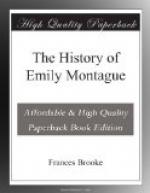A vast plain appeared in motion; it advanced with solemn and majestic pace: the points of land on the banks of the river for a few moments stopped its progress; but the immense weight of so prodigious a body, carried along by a rapid current, bore down all opposition with a force irresistible.
There is no describing how beautiful the opening river appears, every moment gaining on the sight, till, in a time less than can possibly be imagined, the ice passing Point Levi, is hid in one moment by the projecting land, and all is once more a clear plain before you; giving at once the pleasing, but unconnected, ideas of that direct intercourse with Europe from which we have been so many months excluded, and of the earth’s again opening her fertile bosom, to feast our eyes and imagination with her various verdant and flowery productions.
I am afraid I have conveyed a very inadequate idea of the scene which has just passed before me; it however struck me so strongly, that it was impossible for me not to attempt it.
If my painting has the least resemblance to the original, your Lordship will agree with me, that the very vicissitudes of season here partake of the sublimity which so strongly characterizes the country.
The changes of season in England, being slow and gradual, are but faintly felt; but being here sudden, instant, violent, afford to the mind, with the lively pleasure arising from meer change, the very high additional one of its being accompanied with grandeur. I have the honor to be,
My Lord,
Your Lordship’s,
&c.
William
Fermor.
LETTER 132.
To Mrs. Temple, Pall Mall.
April 22.
Certainly, my dear, you are so far right; a nun may be in many respects a less unhappy being than some women who continue in the world; her situation is, I allow, paradise to that of a married woman, of sensibility and honor, who dislikes her husband.
The cruelty therefore of some parents here, who sacrifice their children to avarice, in forcing or seducing them into convents, would appear more striking, if we did not see too many in England guilty of the same inhumanity, though in a different manner, by marrying them against their inclination.
Your letter reminds me of what a French married lady here said to me on this very subject: I was exclaiming violently against convents; and particularly urging, what I thought unanswerable, the extreme hardship of one circumstance; that, however unhappy the state was found on trial, there was no retreat; that it was for life.
Madame De —— turned quick, “And is not marriage for life?”
“True, Madam; and, what is worse, without a year of probation. I confess the force of your argument.”
I have never dared since to mention convents before Madame De ——.
Between you and I, Lucy, it is a little unreasonable that people will come together entirely upon sordid principles, and then wonder they are not happy: in delicate minds, love is seldom the consequence of marriage.




